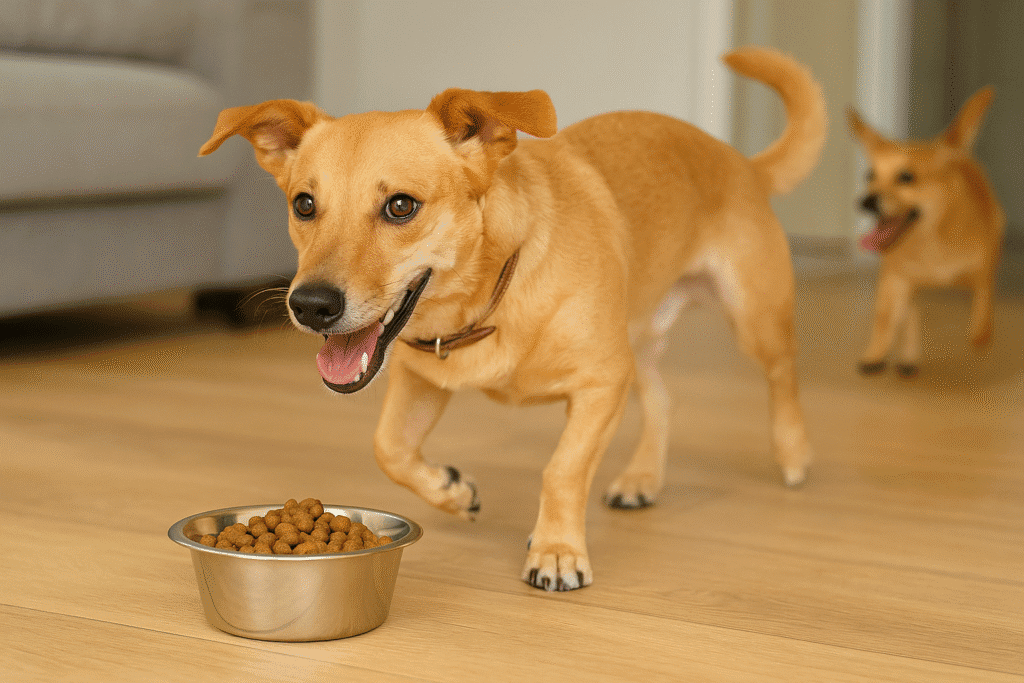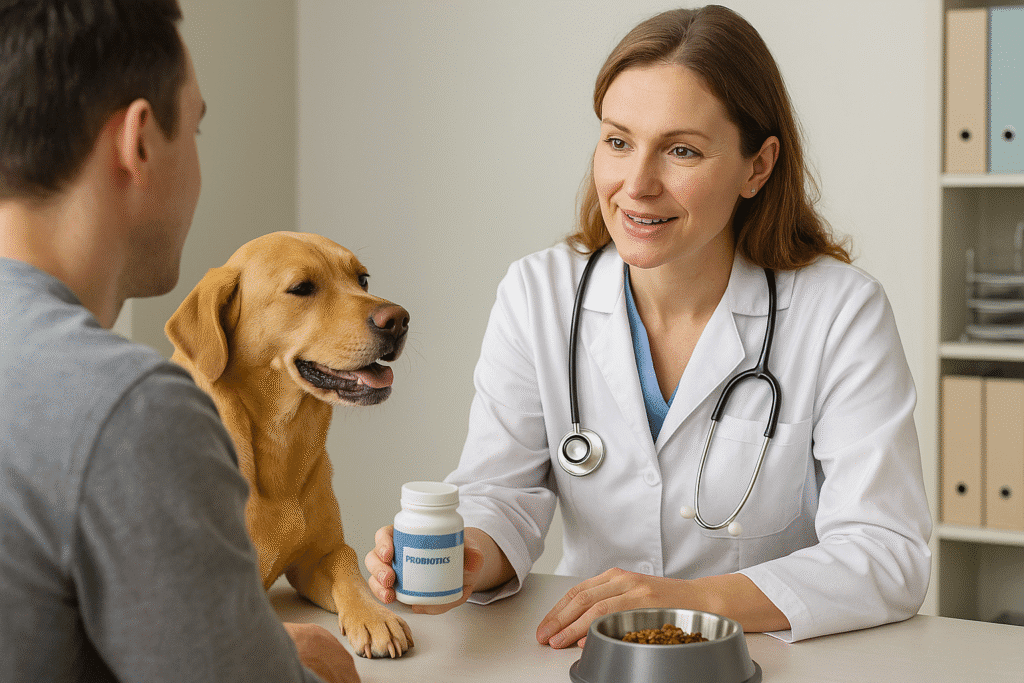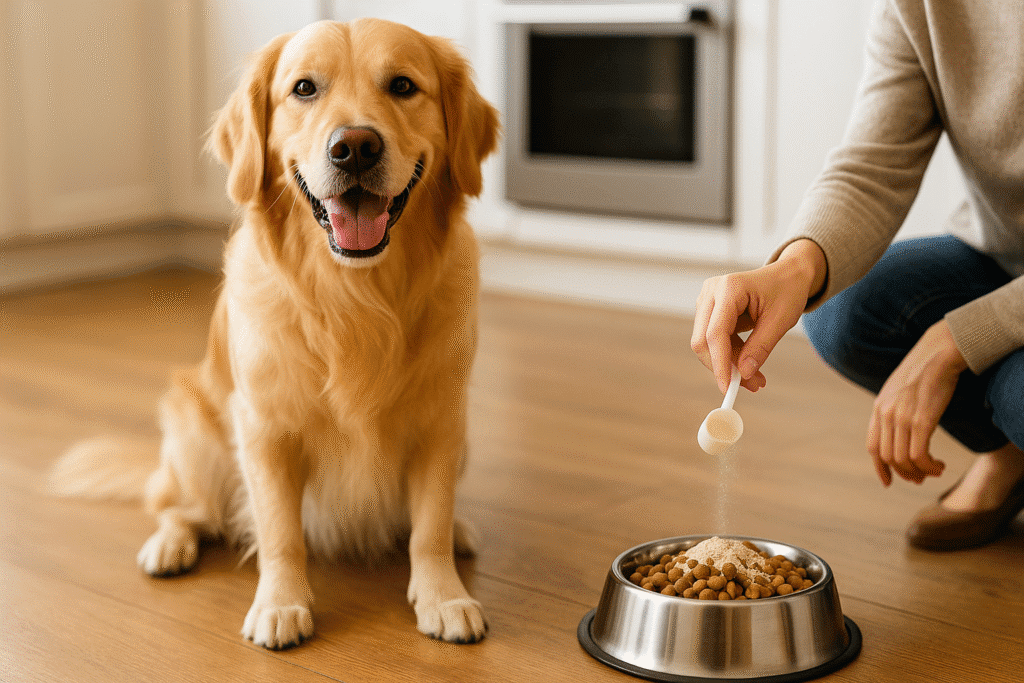This guide on dog probiotics for gut health explains how probiotics improve digestion, strengthen immunity, and prevent common health problems in dogs. Learn about the benefits, safe usage, recommended types, and important safety tips to ensure your furry friend enjoys a healthier, happier life.
Introduction
The digestive system is central to your dog’s overall health, and one of the best ways to support it is through dog probiotics for gut health. Probiotics are beneficial bacteria that balance the gut microbiome, helping with digestion, nutrient absorption, and immune defense. This article explores what probiotics are, their benefits, how to use them safely, and what precautions every dog owner should know.

What Are Probiotics for Dogs?
Probiotics are live microorganisms, primarily bacteria, that reside in the digestive system. In dogs, these “good bacteria” help break down food, fight harmful pathogens, and maintain balance in the gut microbiome. When this balance is disrupted by antibiotics, poor diet, or illness, probiotics can help restore harmony and improve overall health.
Benefits of Dog Probiotics for Gut Health
Improved Digestion
Probiotics enhance the breakdown of food, making nutrients more accessible for absorption. This helps reduce bloating, constipation, and diarrhea.
Boosted Immune System
Nearly 70% of a dog’s immune system resides in the gut. By promoting healthy bacteria, probiotics strengthen the immune defense against infections and allergies.
Reduced Gastrointestinal Issues
Dogs suffering from irritable bowel syndrome (IBS), inflammatory bowel disease (IBD), or chronic diarrhea may experience relief with probiotics.
Better Nutrient Absorption
A balanced gut improves the absorption of essential vitamins, minerals, and amino acids that contribute to energy, coat health, and overall vitality.
Allergy Relief
Some studies suggest that probiotics can reduce skin allergies in dogs by strengthening the immune system and lowering inflammatory responses.
(Outbound link: Learn more about canine probiotics at PetMD: Probiotics for Dogs)

When Should Dogs Take Probiotics?
- After Antibiotic Use: Antibiotics can wipe out good bacteria, and probiotics help restore balance.
- Digestive Upset: Frequent diarrhea, bloating, or gas may indicate a gut imbalance.
- Stressful Situations: Traveling, moving, or changes in routine can cause digestive issues that probiotics may help prevent.
- Chronic Skin or Allergy Issues: Dogs with recurring skin allergies or itching may benefit from improved gut health.
Types of Dog Probiotics
Probiotics come in several forms, each with its pros and cons:
- Powders: Easy to mix with food, often highly concentrated.
- Capsules: Convenient for accurate dosing but may be harder to administer.
- Chews: Tasty and easy to give, especially for picky eaters.
- Yogurt & Fermented Foods: Natural sources of probiotics, though less controlled in dosage.
Safe Usage Guidelines
Dosage Recommendations
Always follow product-specific instructions or your veterinarian’s advice. Too much can lead to bloating or gas, while too little may not be effective.
Quality Matters
Choose probiotics specifically designed for dogs. Human probiotics may not survive in a dog’s digestive tract, reducing effectiveness.
Consistency Is Key
For best results, probiotics should be given daily. Consistent use supports long-term gut health and immune strength.
(Internal link: Learn more about maintaining a healthy diet in our Best Diet Tips for Overweight Pets)
Potential Risks and Precautions
- Mild Digestive Upset: Some dogs may experience gas or loose stools when starting probiotics.
- Underlying Conditions: Dogs with chronic illnesses should only take probiotics under veterinary guidance.
- Product Quality: Not all supplements are created equal—choose reputable brands tested for purity and effectiveness.
Choosing the Right Probiotic for Your Dog
When selecting a probiotic, look for:
- Strains proven effective in dogs, such as Lactobacillus and Bifidobacterium.
- Guaranteed live cultures until the expiration date.
- Added prebiotics, which help feed beneficial bacteria.

Frequently Asked Questions (FAQ)
- Can dogs take human probiotics?
It’s not recommended. Human probiotics may not survive in a dog’s digestive system and could be ineffective. - How long do probiotics take to work in dogs?
Many dogs show improvement within a few days to a week of consistent use. - Can probiotics help with dog allergies?
Yes, some evidence suggests probiotics may reduce allergy symptoms by supporting immune health. - Are probiotics safe for puppies?
Yes, but always consult your vet for appropriate dosages based on age and size. - Do probiotics replace a healthy diet?
No. Probiotics supplement a balanced diet but cannot replace proper nutrition.
Conclusion
Dog probiotics for gut health play a vital role in improving digestion, boosting immunity, and enhancing overall well-being. With the right probiotic supplement and consistent care, your dog can enjoy a healthier gut and a stronger immune system. Always consult your veterinarian before starting any new supplement to ensure safety and effectiveness.
Call to Action
Want to learn more about keeping your pet healthy? Check out our complete guide on essential pet vaccines.


핑백: Dog Constipation Relief Fast: Vet-Approved Home Remedies That Work
핑백: Dog Vomiting Remedies: Quick Relief for Sensitive Stomachs